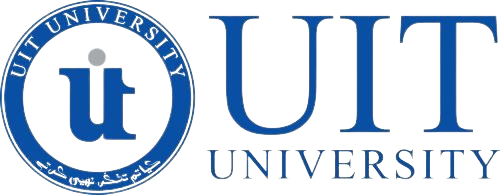Department of Management Sciences
- Home
- Faculty
- Department of Management Sciences
Department of Management Sciences
Management Sciences Programs
Chairperson of the Department
Dr. Muhammad Farhan Bukhari
Introduction
Vision:
To be a trailblazer in Management Science, driving innovation, and fostering impactful leadership in a rapidly evolving global landscape.
Mission
Empowering students with cutting-edge knowledge, analytical skills, and ethical values to excel as agile leaders, problem-solvers, and change-makers in diverse industries and communities.
Introduction to Management Science Programs: BBA and BS in Accounting and FinanceManagement Sciences at UIT University the esteemed faculty is delighted to offer admissions to our Bachelor of Business Administration (BBA) program and Bachelor of Science (BS) program in Accounting and Finance. These programs are designed to provide students with a comprehensive understanding of key principles, practices, and skills essential for success in the ever-evolving fields of business, accounting, and finance.
Bachelor of Business Administration (BBA):
The BBA program at UIT University’s tailored to equip students with a solid foundation in business fundamentals, leadership skills, and strategic thinking. Through a rigorous curriculum encompassing areas such as management, marketing, finance, human resources, and entrepreneurship, students will gain the knowledge and expertise necessary to thrive in diverse organizational settings. Our BBA program emphasizes experiential learning, allowing students to apply theoretical concepts to real-world business scenarios through internships, case studies, and collaborative projects.
Bachelor of Science (BS) in Accounting and Finance:
The BS program in Accounting and Finance offers students a specialized focus on financial accounting, managerial accounting, taxation, auditing, and financial management. Designed for those with a keen interest in financial analysis, reporting, and decision-making, this program prepares students for careers in accounting firms, financial institutions, corporations, and government agencies. With a curriculum that integrates theory with practical application, students will develop the analytical skills, ethical mindset, and technical proficiency needed to excel in the dynamic field of accounting and finance.
Objectives of the Management Science Department:
Academic Excellence: Our primary objective is to uphold and promote academic excellence by offering rigorous and relevant curriculum, fostering critical thinking, and encouraging intellectual inquiry among students and faculty.
Student Success: We are committed to providing a supportive learning environment that empowers students to achieve their academic and professional goals. Our objective is to equip students with the knowledge, skills, and resources necessary for success in their chosen fields.
Research and Innovation: We aim to foster a culture of research and innovation within the department, promoting scholarly inquiry, interdisciplinary collaboration, and the dissemination of knowledge through publications, conferences, and other academic forums.
Industry Relevance: We strive to ensure that our programs remain relevant to the needs of the industry by regularly reviewing and updating curriculum to align with emerging trends, technologies, and best practices in management science fields.
Ethical Leadership: We are dedicated to cultivating ethical leadership qualities among our students, emphasizing integrity, responsibility, and social accountability in their academic and professional endeavors.
Community Engagement: We seek to actively engage with the broader community, including industry partners, alumni, and other stakeholders, to foster mutually beneficial relationships, promote knowledge exchange, and contribute to the socioeconomic development of society.
Continuous Improvement: We are committed to continuous improvement and quality enhancement in all aspects of our department’s activities, including teaching, research, student support services, and administrative processes.

